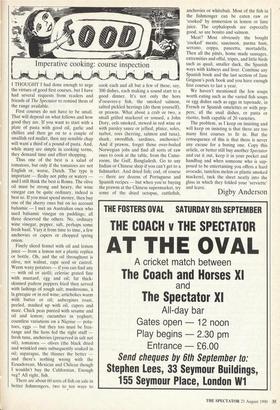Imperative cooking: course inspection ..dottL y n i
L.
I THOUGHT I had done enough to urge the virtues of good first courses, but I have had several requests from readers and friends of The Spectator to remind them of the range available.
First courses do not have to be small. That will depend on what follows and how good they are. If you want to start with a plate of pasta with good oil, garlic and chillies and then go on to a couple of smallish red mullet, then any sensible chap will want a third of a pound of pasta. And, while many are simple in cooking terms, they demand time and effort shopping.
Thus one of the best is a salad of tomatoes, but only if the tomatoes are not English or, worse, Dutch. The type is important — fleshy not pithy or watery and I still think the best is Roma. The olive oil must be strong and heavy, the wine vinegar can be quite ordinary, indeed is best so. If you must spend money, then buy one of the sherry ones but on no account balsamic — I met an Australian once who used balsamic vinegar on puddings; all three deserved the others. No, ordinary wine vinegar, pepper, salt, perhaps some fresh basil. Vary it from time to time, a few anchovies or capers or chopped spring onion.
Finely sliced fennel with oil and lemon juice — from a lemon not a plastic replica or bottle. Oh, and the oil throughout is olive, not walnut, rape seed or castrol. Warm waxy potatoes — if you can find any — with oil or aiolli; celeriac grated fine with mustard, egg and oil; fat thick- skinned padron peppers fried then served with lashings of rough salt; mushrooms, a la grecque or in red wine; artichokes warm with butter or oil; aubergines roast, peeled, mashed up with oil, capers and marc. Chick peas puréed with sesame and oil and lemon; cucumber in yoghurt; countless variations on a Nigoise — pota- toes, eggs — but they too must be free- range and the hens fed the right stuff fresh tuna, anchovies (preserved in salt not oil), tomatoes — olives (the black dried and wrinkled ones subsequently soaked in oil; asparagus, the thinner the better and there's nothing wrong with the Ecuadorean, Mexican and Chilean though I wouldn't buy the Californian. Enough veg? All right, fish.
There are about 60 sorts of fish on sale in better fishmongers, two to .ten ways to cook each and all but a few of these, say, 300 dishes, each making a sound start to a good dinner. It's not only the hors d'oeuvres-y fish, the smoked salmon, salted pickled herrings (do them yourself), or prawns. What about a crab or two, a small grilled mackerel or soused, a John Dory, eels smoked, stewed in red wine or with parsley sauce or jellied, plaice, soles, turbot, roes (herring, salmon and tuna), shark, swordfish, sardines, anchovies? And if prawns, forget those over-boiled Norwegian jobs and find all sorts of raw ones to cook at the table, from the Came- roons, the Gulf, Bangladesh. Go to any Indian or Chinese shop if you can't get to a fishmarket. And dried fish; cod, of course — there are dozens of Portuguese and Spanish recipes — but when you're buying the prawns at the Chinese supermarket, try some of the dried octopus, cuttlefish,
anchovies or whitebait. Most of the fish in the fishmonger can be eaten raw or `cooked' by immersion in lemon or lime juice. The cephalopods are especially good, so are bonito and salmon.
Meat? Most obviously the bought `cooked' meats; saucisson, parma ham, serrano, coppa, pancetta, mortadella. Then all the pâtés, home made sausages, extremities and offal, tripes, and little birds such as quail, smaller duck, the Spanish ways with kidneys and liver. Combine any Spanish book and the last section of Jane Grigson's pork book and you have enough first courses to last a year.
We haven't mentioned the few soups worth eating such as the varied fish soups or egg dishes such as eggs in tapenade, in French or Spanish omelettes or with pep- pers; all the snail dishes, or pasta or risotto, both capable of 20 varieties.
The problem, as I keep on insisting and will keep on insisting is that there are too many first courses to fit in. But the consequence of this is that there is never any excuse for a boring one. Copy this article, or better still buy another Spectator and cut it out, keep it in your pocket and handbag and when someone who is sup- posed to be entertaining you offers a hard avocado, tasteless melon or plastic smoked mackerel, tuck the sheet neatly into the glass in which they folded your 'serviette' and leave.
Digby Anderson










































 Previous page
Previous page